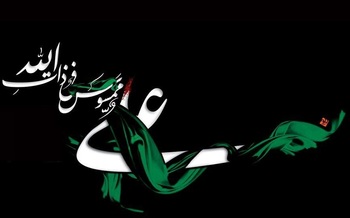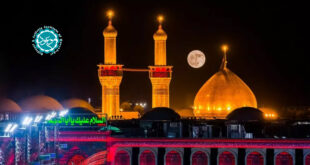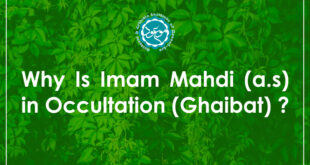Statements of prominent scholars regarding Imam Ali (A.S.):
Ibn Abil Hadid, the well-known Egyptian commentator on the book Nahj al-Balagha (The Peak of Eloquence), says that Ali had a personality in which opposing characteristics had so gathered themselves that it was difficult to believe that such a combination could manifest itself in a human being. He was the bravest man and boldest warrior that history could cite, and while such brave persons are almost always hard-hearted, cruel, and blood-thirsty, instead Ali was kind, sympathetic, responsive, and a warm-hearted person. These are the qualities of one who is pious and God-fearing. He was friendly with the rich, poor, educated, and ignorant alike. He had a tender spot in his heart for every downtrodden, crippled, widowed, or orphaned person. He was always seen smiling and giving happy greetings, and was known to be very witty and could not be overcome in debate.
Once, in a discussion about Imam Ali, Abdullah ibn Ahmed ibn Hanbal made the remark that the seat of the Caliphate did not bring any honor and glory to Ali, but was itself honored and glorified because of Ali.
Allama Askari Ja’fari adds: “The world cannot quote an example, other than that of Ali, who was a first-class warrior and marshal, a philosopher and moralist, and a great teacher of religious principles and theology. The study of his life shows that his sword was the only help which Islam received during its early days of struggle and wars of self-defense. For Islam, he was the first line of defense, the second line of defense, and the last line of defense.”
Imam Ali on the battlefield
The Battle of Badr:
This battle alone provides an adequate example of Ali’s courage, valor, and unmatched fighting skills. It is hardly an exaggeration to say that he alone was responsible for the victory in that battle. This battle took place in the month of Ramadan, 2 A.H., 624 A.D. About 1,000 Meccan Quraish warriors challenged some 313 ill-prepared and poorly equipped Muslims; the gross mismatch was obvious. In the ensuing battle, Imam Ali (A.S.) killed several famous Arab warriors, sending a wave of fear through the enemy ranks and dashing their hopes of victory. The Meccan army retreated in shameful defeat. A total of 70 of the enemy soldiers had been killed and 36 of them had fallen to Ali’s sword.
The Battle of Uhud:
This battle took place in the following year. The Quraish of Mecca mobilized a large army and returned to avenge their defeat at the hands of the Muslims. Initially, the Muslims were victorious. However, due to the greed and disobedience of some of the Muslim soldiers, who abandoned their posts and ran to collect the spoils of war, the enemy had time to regroup and launch a new offensive, overpowering the defensive lines of the Muslim army. Panic ensued as there was a cry that “Muhammad is dead!” Upon hearing these cries, even more of the Muslims fled the battlefield in confusion and fear. Only four faithful and brave soldiers and companions of the Holy Prophet (S.A.W.) remained by his side to protect him. They were Ali, Hamza, Abu Dujana, and Zakwan. At one point Ali alone was defending the Holy Prophet (S.A.W.). Ali beckoned to the Muslims that the Holy Prophet (S.A.W.) was alive, and to return to their duty. Thereafter, the Muslims regrouped and defeated the enemy. Imam Ali killed 28 renowned Arab warriors and received 16 wounds. The Prophet himself was injured. Had it not been for Ali, the Holy Prophet (S.A.W.) would have been killed. Later on, the Holy Prophet (S.A.W.) informed the Muslims that Angel Gabriel was there on the battlefield, loudly praising Ali with these words: “There is no braver youth than Ali, and there is no better sword than Zulfiqar!” (The name given to Ali’s famous two-pronged sword). This is event is recorded in Waqudi’s “History of the Prophets,” and in Tabari’s “Tarikh”.
The Battle of the Trench (Ahzab):
In the 5th year after Hijra, the Meccans returned with 10,000 soldiers, determined once and for all to wipe out Islam. The Holy Prophet (S.A.W.) ordered that a trench be dug around the camp of the Muslim army, in order to protect his small force of 2,000 fighters. In command of the Meccan army was Amr ibn Abdul-Wudh, a fierce and mighty warrior who was as renowned and feared in Arabia as equal to the great Persian warrior Rustum. He and several of his brave companions managed to jump their horses across the trench and challenged the Muslims to hand-to-hand combat. One by one, Amr called out the names of some of the most well-known individuals and companions of the Prophet in the Muslim camp and challenged them to duel, but they did not respond, being frozen by fear. Only Imam Ali stood up with the will and resolve to accept Amr’s challenge. But the Holy Prophet (S.A.W.) did not allow him to fight. Finally, Amr taunted the Muslims collectively, and the Holy Prophet (S.A.W.) in particular, as cowards unwilling to put their faith to the test. He threw a spear directly at the tent of the Holy Prophet (S.A.W.) which pierced his tent. Ali was finally granted permission by the Holy Prophet (S.A.W.) to go out and fight Amr. The Holy Prophet (S.A.W.) declared, as he sent Ali out to fight, “Today, faith in embodiment is facing infidelity in embodiment.” Many of the Muslims, thinking that Ali was no match for Amr, came out to look at Ali’s face for the last time. In the ensuing duel however, Ali killed Amr as well as two other renowned enemy warriors. The remaining ones who had jumped the trench fled back to their own ranks. The Meccans besieged the Muslim camp for several days and finally retreated from the battlefield due to dwindling supplies, adverse weather, and low morale. Thus, it was Imam Ali alone who was responsible for demolishing the morale of the enemy and securing victory for the Muslim warriors.
The Battle of Khyber:
In the 7th year after Hijra, the Muslims marched against the rebellious Jewish clan which was holding the fortress of Khyber. On two successive days the Holy Prophet (S.A.W.) sent the Muslim army under the leadership of a different commander from among his Sahaba, but in both instances the Muslims came back defeated.
Al-Bukhari and Muslim have recorded in their Sahih collections that on the eve before the third day of battle, the Holy Prophet (S.A.W.) announced, “Tomorrow, I shall give the standard (flag) of Islam to a man who loves Allah and His Messenger, and Allah and His Messenger love him.” He also added that it would be to the man “…who is brave, who would not show his back to the enemy, and would not return without success.” Every soldier in the Muslim army went to sleep that night pondering who that man would be, and praying that the honor would be bestowed on him. The next morning, the Holy Prophet (S.A.W.) called for Imam Ali, gave him the standard of Islam, and sent the army out under his command. Ali fought and killed the mighty and dreaded warrior Mehrab, as well as several other highly reputed enemy warriors. He also broke open the door of the fortress single-handedly and flung it across the moat so that the Muslim army could enter and secure the fortress. When Ali victoriously returned, the Holy Prophet (S.A.W.) embraced him and showered him with praises, including these words: “…Ali, you will be nearest to me on the Day of Judgment; you will be next to me at the Fountain of Kauthar; your blood is my blood, your flesh is my flesh, your friendship is my friendship, and your enmity is my enmity; a war against you is a war against me!”
 Mouood Mouood English Edition
Mouood Mouood English Edition




